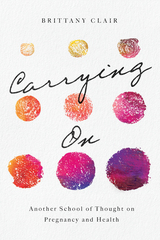
Carrying On investigates the origin stories of prevailing prenatal health norms by exploring the evolution of issues at the center of pregnancy, ranging from morning sickness and weight gain to ultrasounds and induction. When did women start taking prenatal vitamins, and why? When did the notion that pregnant women should “eat for two” originate? Where did exercise guidelines come from? And when did women start formulating birth plans?
A learning project with one foot in the past and the other in the present, Carrying On considers what history and medicine together can teach us about how and why we treat pregnancy–and pregnant women–the way we do. In a world of information overload, Carrying On offers expecting parents the context and background they need to approach pregnancy and prenatal health from a new place of understanding.
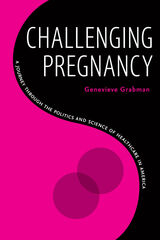
Ultimately, national anti-abortion politics—not medicine or her own choices—determined the outcome of Grabman’s pregnancy. At every juncture, anti-abortion politics limited the care available to her, the doctors and hospitals willing to treat her, the tools doctors could use, and the words her doctors could say. Although she asked for aggressive treatment to save at least one baby, hospital ethics boards blocked all able doctors from helping her.
Challenging Pregnancy is about Grabman’s harrowing pregnancy and the science and politics of maternal healthcare in the United States, where every person must self-advocate for the desired outcome of their own pregnancy.
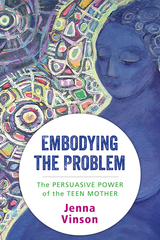
Vinson shows that these representations prevent a focus on the underlying structures of inequality and poverty, perpetuate harmful discourses about women, and sustain racialized gender ideologies that construct women’s bodies as sites of national intervention and control.
Embodying the Problem also explores how young mothers resist this narrative. Analyzing fifty narratives written by young mothers, the recent #NoTeenShame social media campaign, and her interviews with thirty-three young women, Vinson argues that while the stigmatization of teenage pregnancy and motherhood does dehumanize young pregnant and mothering women, it is at the same time a means for these women to secure an audience for their own messages.
More information on the author's website (https://jennavinson.com)
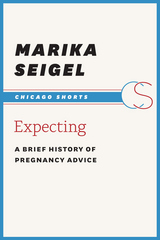
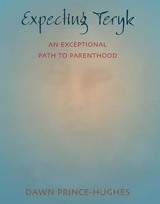
“Expecting Teryk is a rich and sumptuous work that speaks to the deeper realities and represents a unique viewpoint of experiences shared by all individuals who choose the path to parenthood.”—Disability, Pregnancy, and Parenthood
The period just prior to the birth of a child is a time of profound personal transformation for expectant parents. Expecting Teryk: An Exceptional Path to Parenthood is an intimate exploration, written in the form of a letter from a parent to her future son, that reclaims a rite of passage that modern society would strip of its magic.
Dawn Prince-Hughes, renowned author of Songs of the Gorilla Nation: My Journey through Autism, considers the ways being autistic might inform her parenting. She also candidly narrates her experience of becoming a parent as part of a lesbian couple—from meeting her partner to the questions they ask about their readiness to become parents and the practical considerations of choosing a sperm donor.
Expecting Teryk is viewed through the lens of autism as Prince-Hughes shares the unique way she sees and experiences the world—as well as her aching will to be fully present for her son. Contemplating the evolutionary traditions of parenting from both animal and human perspectives and the reassurances that nature offers, Expecting Teryk is a work of sensuous wonder that speaks to the deeper realities and archetypal experiences shared by all who embark on the journey of parenthood.
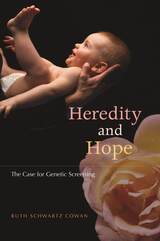
The secrets locked in our genes are being revealed, and we find ourselves both enthused and frightened about what that portends. We look forward to curing disease and alleviating suffering—for our children as well as for ourselves—but we also worry about delving too deeply into the double helix. Abuses perpetrated by eugenicists—from involuntary sterilization to murder—continue to taint our feelings about genetic screening.
Yet, as Ruth Schwartz Cowan reveals, modern genetic screening has been practiced since 1960, benefiting millions of women and children all over the world. She persuasively argues that new forms of screening—prenatal, newborn, and carrier testing—are both morally right and politically acceptable. Medical genetics, built on the desire of parents and physicians to reduce suffering and increase personal freedom, not on the desire to “improve the human race,” is in fact an entirely different enterprise from eugenics.
Cowan’s narrative moves from an account of the interwoven histories of genetics and eugenics in the first half of the twentieth century, to the development of new forms of genetic screening after mid-century. It includes illuminating chapters on the often misunderstood testing programs for sickle cell anemia, and on the world’s only mandated premarital screening programs, both of them on the island of Cyprus.
Neither minimizing the difficulty of the choices that modern genetics has created for us nor fearing them, Cowan bravely and compassionately argues that we can improve the quality of our own lives and the lives of our children by using the modern science and technology of genetic screening responsibly.
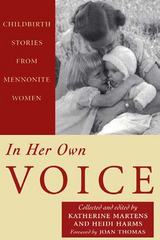
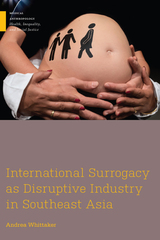
In International Surrogacy as Disruptive Industry in Southeast Asia, Andrea Whittaker traces the development of this industry and its movement across Southeast Asia following a sequence of governmental bans in India, Nepal, Thailand, and Cambodia. Through a case study of the industry in Thailand, the book offers a nuanced and sympathetic examination of the industry from the perspectives of the people involved in it: surrogates, intended parents, and facilitators. The industry offers intended parents the opportunity to form much desired families, but also creates vulnerabilities for all people involved. These vulnerabilities became evident in cases of trafficking, exploitation, and criminality that emerged in southeast Asia, leading to greater scrutiny on the industry as a whole. Yet the trade continues in new flexible hybrid forms, involving the circulation of reproductive gametes, embryos, surrogates, and ova donors across international borders to circumvent regulations. The book demonstrates the need for new forms of regulation to protect those involved in international surrogacy arrangements.
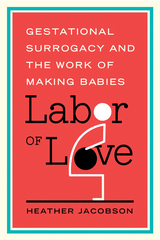
For more, visit http://www.heatherjacobsononline.com/
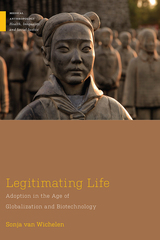
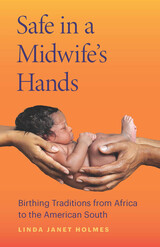
After a less-than-positive experience giving birth as a Black woman in the 1970s, Linda Janet Holmes launched a lifetime of work as an activist dedicated to learning about and honoring alternative birth traditions and the Black women behind them. Safe in a Midwife’s Hands brings together what Holmes has gleaned from the countless midwives who have shared with her their experiences, at a time when their knowledge and holistic approaches are essential counterbalances to a medical system that routinely fails Black mothers and babies. Building on work she began in the 1980s, when she interviewed traditional Black midwives in Alabama and Virginia, Holmes traveled to Ghana, Ethiopia, and Kenya to visit midwives there. In detailing their work, from massage to the uses of medicinal plants to naming ceremonies, she links their voices to those of midwives and doulas in the US. She thus illuminates parallels between birthing traditions that have survived hundreds of years of colonialism, enslavement, Jim Crow, and ongoing medical racism to persist as vital cultural practices that promote healthy outcomes for mothers and babies during pregnancy, birth, and beyond.
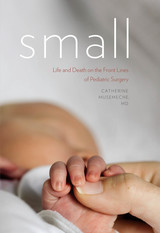
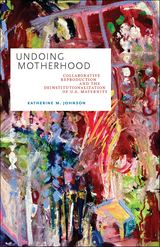
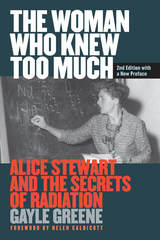
Author Gayle Greene traces Stewart's life and career as she came up against ever more powerful authorities, first the British medical profession, then the U.S. nuclear industry, and finally the regulatory agencies that set radiation safety standards throughout the world. Stewart endured the fate of other women scientists in having her findings dismissed and funding cut, but today is recognized as a pioneering figure in epidemiological research on the dangers of nuclear radiation. In her preface to the second edition, Greene looks at new information that’s come out about the forces and individuals responsible for marginalizing her as a scientist and downplaying the disturbing implications of her research.
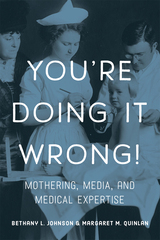
You’re Doing it Wrong! investigates the storied history of mothering advice in the media, from the newspapers, magazines, doctors’ records and personal papers of the nineteenth-century to today’s websites, Facebook groups, and Instagram feeds. Johnson and Quinlan find surprising parallels between today’s mothering experts and their Victorian counterparts, but they also explore how social media has placed unprecedented pressures on new mothers, even while it may function as social support for some. They further examine the contentious construction of prenatal and baby care expertise itself, as individuals such as everyone from medical professionals to experienced moms have competed to have their expertise acknowledged in the public sphere.
Exploring potential health crises from infertility treatments to “better babies” milestones, You’re Doing it Wrong! provides a provocative look at historical and contemporary medical expertise during conception, pregnancy, childbirth, postpartum, and infant care stages.
READERS
Browse our collection.
PUBLISHERS
See BiblioVault's publisher services.
STUDENT SERVICES
Files for college accessibility offices.
UChicago Accessibility Resources
home | accessibility | search | about | contact us
BiblioVault ® 2001 - 2024
The University of Chicago Press









